2025-11-27
In October, in Brazzaville, Republic of Congo, representatives from eight Tenure Facility partners gathered for the latest Spring FIRE training on transactional and managerial finance. The participating organisations were the Union of Associations and Coordination of Associations for the Development and Defence of the Rights of the Disadvantaged (UACDDDD) from Mali; Union for the Emancipation of Indigenous Women (UEFA), Integrated Programme for the Development of the Pygmy People (PIDP), Network for the Conservation and Rehabilitation of Forest Ecosystems (Réseau CREF), and Union of Indigenous Peoples of Monkoto (UPAM) from the Democratic Republic of Congo (DRC); Association Sanguia Baka Buma’a Kpode (ASBABUK) and Bagyeli’s Cultural and Development Association (BACUDA) from Cameroon; and National Network of Indigenous Peoples of Congo (RENAPAC) from the Republic of Congo.
They form part of a wider network of approximately 30 partners and co-implementers across the Congo Basin and Mali who have participated in Spring FIRE since 2022. Close to 150 individuals have joined this learning process so far, with demonstrated results.
Over five days, finance officers, project leads, and organisational heads worked side by side to strengthen one of the most vital parts of their work: building resilient, transparent, and sustainable financial systems. Partnering with Spring Strategies—an organisation that supports social-change groups to develop financial resilience—the Tenure Facility team was there not to lead but to listen, observe, and accompany partners on a path we’ve been cycling together. This journey supports financial confidence, accountability, and autonomy, and helps position partners to access direct climate finance over time.
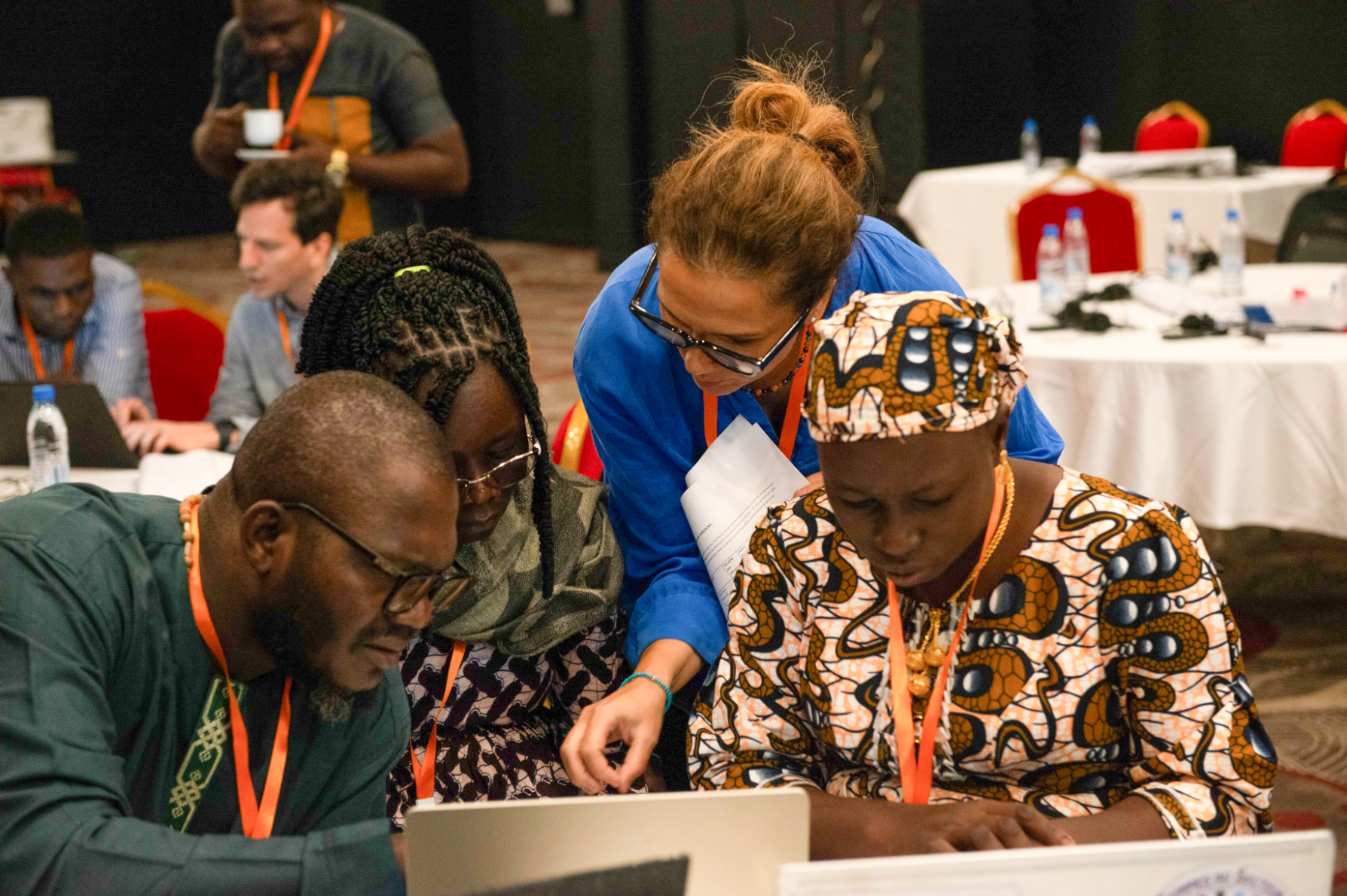
Participants carrying out practical activity - Spring FIRE training
The sessions explored both the transactional and managerial dimensions of finance, as well as financial sustainability through fundraising and institutional planning.
The learning journey began in 2022, when Tenure Facility began allocating funding for Spring FIRE trainings with partners worldwide. Between 2022 and 2024, we sponsored four FIRE trainings in Belize, Colombia, India, and Nepal, with Brazzaville marking the fifth. Alongside these, Tenure Facility and commissioned experts have delivered other key trainings—such as those on OHADA compliance in the DRC—to strengthen partners’ financial reporting and governance practices.
Each training adapts its content to the specific priorities and needs of the partners in the room. The trainings aim to steadily strengthen both financial and governance systems to support partners’ daily work while shifting how financing flows. This applies to both climate finance and broader international development funding. After completing the training, local organisations are better positioned to manage funds directly, make informed decisions, and lead projects from start to finish.
At the heart of this most recent training stood the FIRE framework—finance, integrity, resilience, empowerment—visualised through a bicycle metaphor. In the room, drawing on a large sheet, participants reflected on what it means for the two organisational wheels, finance and programmes, to move in balance.
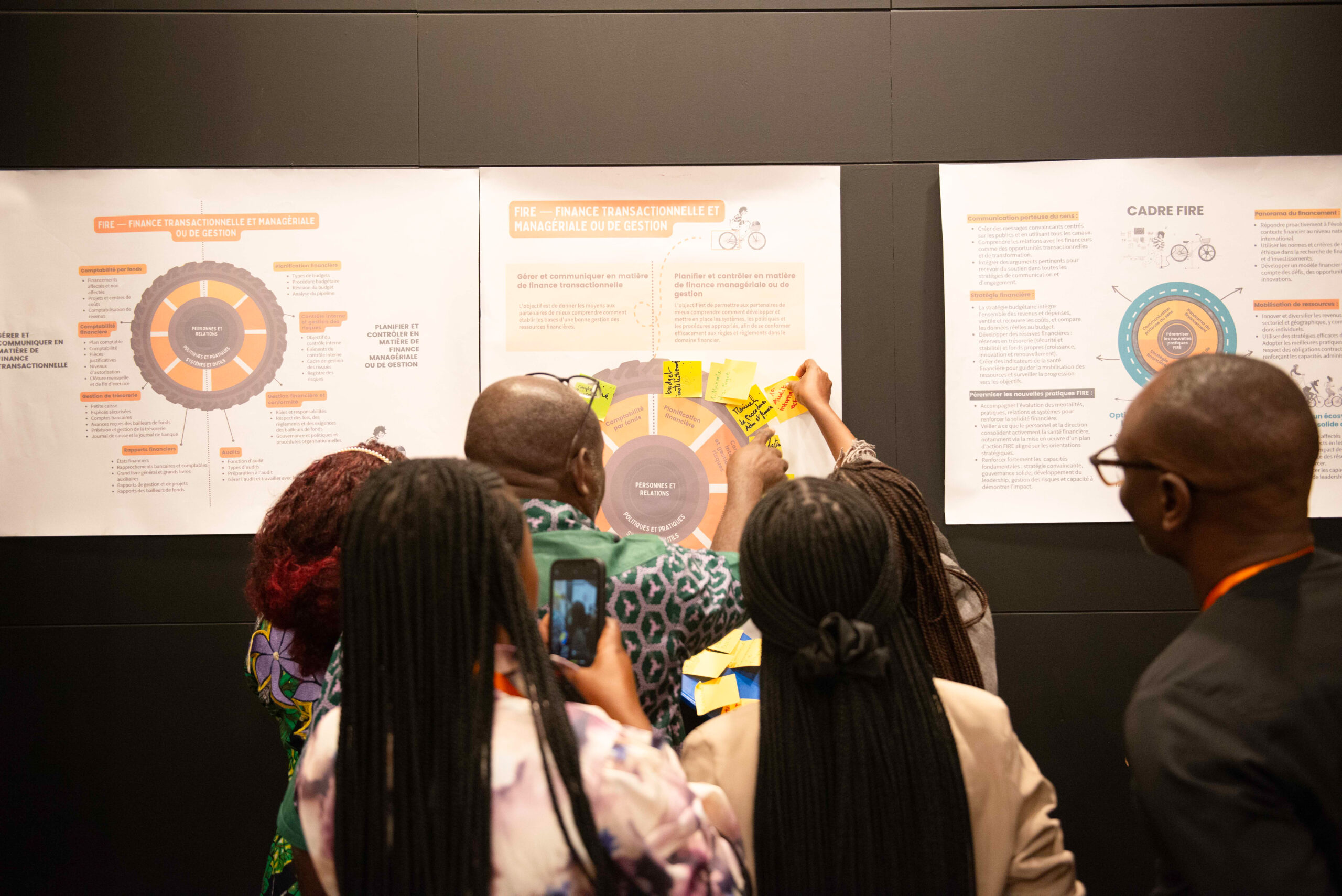
Participants during one of the Spring FIRE Training sessions
The “back wheel” represents finance—the source of stability and motion. The “front wheel” symbolises programmes and strategy, setting direction and vision. When one wheel weakens, the whole organisation feels the imbalance. Partners mapped their own “bicycles” to identify where either wheel may falter, from internal policy gaps to communication breakdowns between teams.
“I realised that finance is not just for accountants. Everyone in an organisation has a role to play in ensuring transparency and accountability,” said Espérance Binyuki Nyota, UEFA’s national coordinator (DRC).
Several insights shaped how partners now view finance, reaching beyond the idea that it only concerns accountants:
Lucía Carrasco Scherer, who leads Spring Strategies’ FIRE programme, emphasised the long-term nature of implementing financial improvements: “The training does not end on Friday. It is an eight-month process.”
This continued journey includes online sessions, peer exchanges, and technical assistance to help organisations embed lessons into everyday practice.
"I realised that finance is not just for accountants. Everyone in an organisation has a role to play in ensuring transparency and accountability."
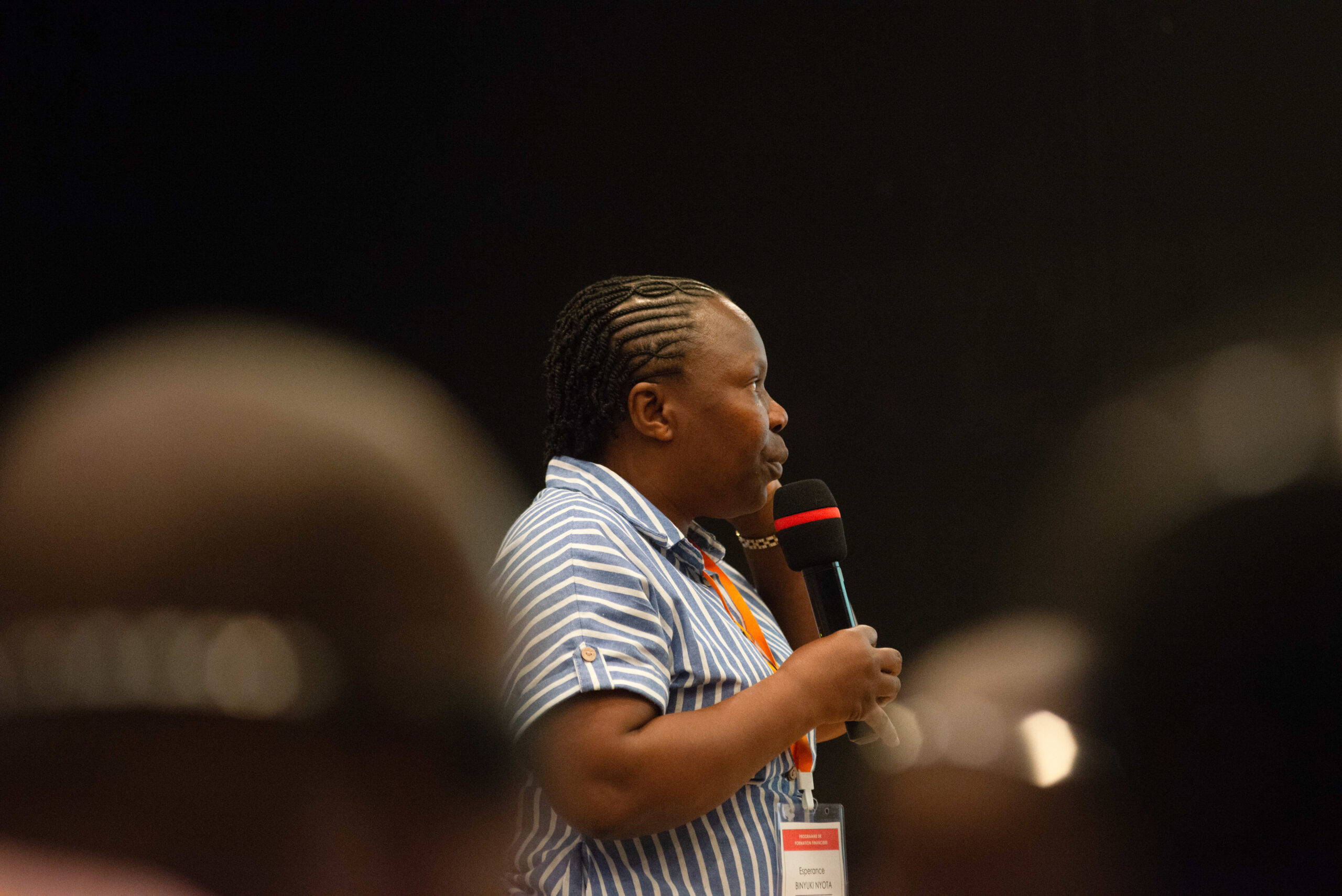
Espérance Binyuki Nyota, UEFA
Partners spoke candidly about what financial management looks like beyond spreadsheets—in contexts where collecting a single invoice can mean travelling for hours to reach a supplier with no registered address or where some community members, unable to read or write, sign receipts with marks. These conditions transform seemingly simple steps into processes requiring additional time, trust, and creativity.
“Sometimes we receive invoices with no address or registry number, and many people in the communities cannot read or write. We have to verify signatures later, which takes time and creates delays,” said Paul Traore, UACDDDD’s financial manager (Mali).
The challenges go deeper: bank closures, cash shortages, and volatile exchange rates can turn a balanced budget by morning into a deficit by afternoon. In remote areas, delayed transfers or frozen accounts mean teams must find alternatives—from mobile payments to chartered flights.
“Bank closures are an issue. Sometimes we must travel from Goma to Beni just to access cash, and even then, the bank might not have any available,” noted Diel Mochire, PIDP’s provincial director in North Kivu (DRC).
The armed conflict in the DRC’s North and South Kivu provinces shifted in early 2025, with the M23 rebel group taking control of two major cities in the region, Goma and Bukavu. Many banks in those cities have been closed since. Partners in the region—PIDP and Réseau CREF in North Kivu, and UEFA and Strong Roots in South Kivu—have had to rely on mobile money transfers to reach their implementation areas. Other partners depend on flights supported by international organisations.
“In certain areas, UPAM only has access to funds when flights operated by WWF [the World Wildlife Fund] bring cash into the territory,” said Nathalie Lefrancq, a finance officer at Tenure Facility.
Listening to these experiences was a powerful reminder that strengthening financial systems cannot be separated from the realities in which partners operate. For Tenure Facility and for donors, this means continuing to invest in flexibility and trust: adapting tools, timelines, and funding models to local realities.
"Sometimes we receive invoices with no address or registry number, and many people in the communities cannot read or write. We have to verify signatures later, which takes time and creates delays."
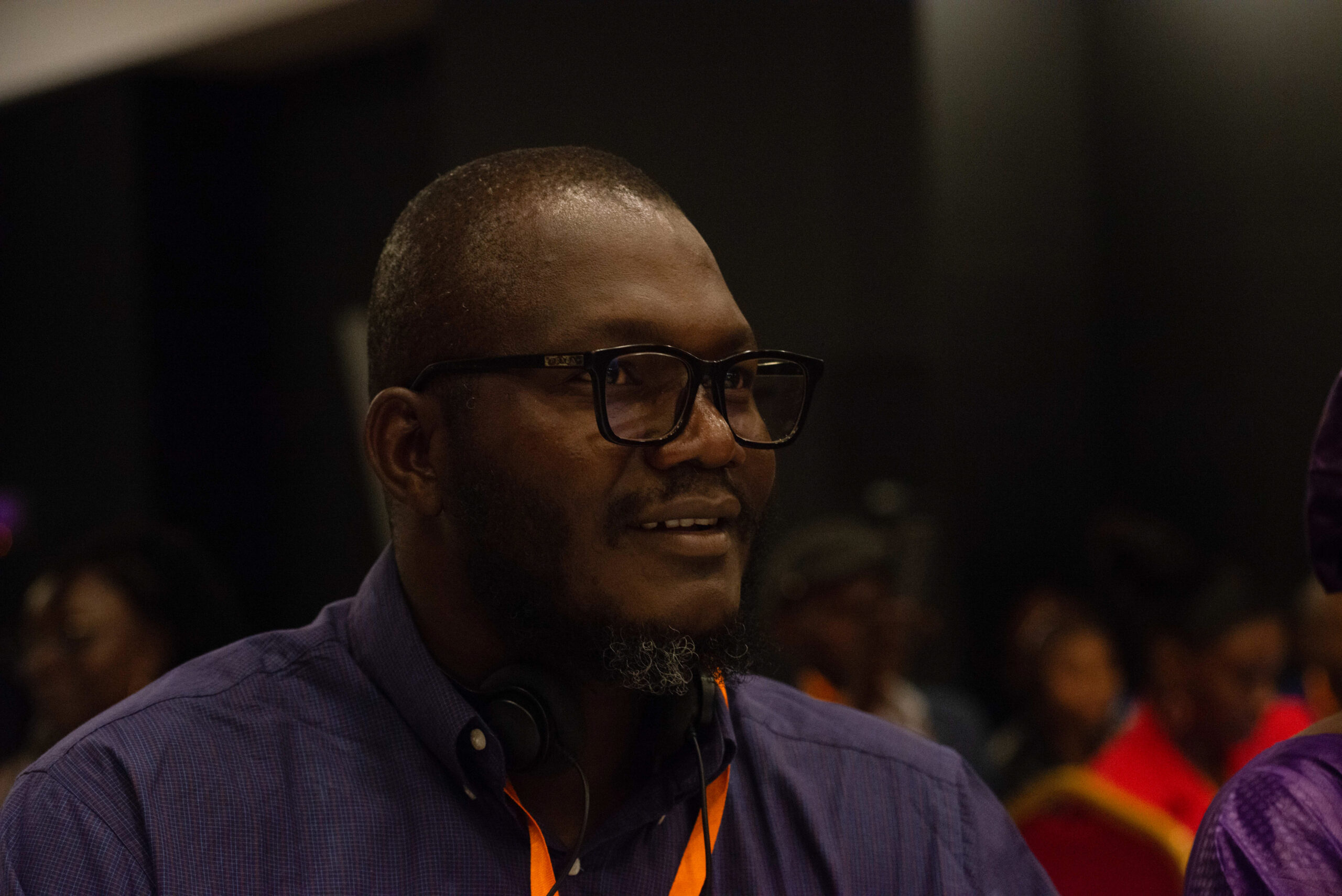
Paul Traore, UACDDDD
Strong finance unlocks credibility. Paul from UACDDDD explained that improved financial management has enabled his organisation to secure additional donor support and expand action for land rights. This experience is shared by others. Tropenbos DRC and Strong Roots have already leveraged improved systems to engage new funders and manage resources with fewer errors and fewer delays.
Several partners have also progressed towards accessing direct funds from donors. Most organisations present at the training in Brazzaville already receive funds directly from Tenure Facility or other funders, though often at a modest scale as they continue building their capacity to bid on larger funding opportunities. Other partners work through fiscal sponsors while strengthening their systems to reach the same milestone.
Gender equity and women’s leadership remained a constant theme throughout the sessions—from budget planning to reflections on governance and accountability. For many partners, inclusion is not to tick a box; it’s the way real change takes root.
“As Indigenous women, we are the guardians of knowledge and transmitters of culture. Empowering women financially means empowering entire communities,” emphasised Espérance Binyuki Nyota from UEFA (DRC).
Jeanne Biloa, the president of BACUDA in Cameroon, noted a similar phenomenon in her country context: “Among us Bagyeli and Baka, women have the voice. To work well with our communities, you must spend time with women.”
Finance was viewed as a pathway to inclusive governance where clarity, equity, and shared responsibility keep the organisational bicycle balanced and in motion.
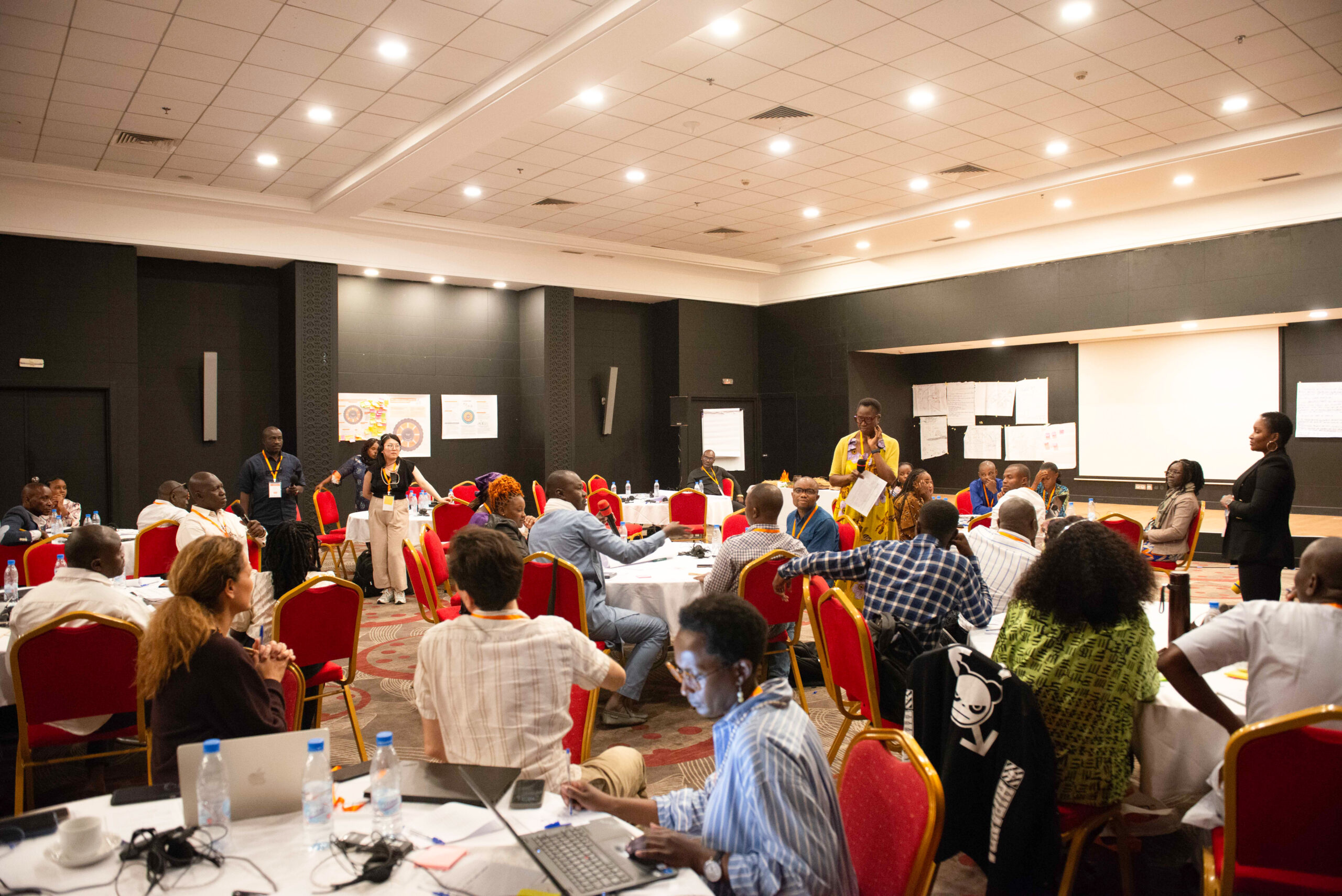
"To donors, we emphasise the importance of institutional support—especially for local organisations like ours. Don’t focus only on isolated projects—look at the broader strategy and strengthen local institutions as a whole. That’s what will make lasting change possible."
Opening the week, Tenure Facility Chief Finance Officer Björn Druse reminded participants that the training was about knowledge transfer: “We learn from you about your needs and strengths. We do our best to support you as you go on about your journey.”
Through the broader Tenure Facility finance programme, and with support from Finance Officer Nathalie Lefrancq, partners have been steadily strengthening their financial management practices alongside the learning offered through Spring FIRE. Our support has helped partners address audit recommendations through actionable follow-up plans that are regularly monitored and implemented. Several organisations, including Tropenbos DRC, the Support Centre for Sustainable Management of Tropical Forests (CAGDFT), and UACDDDD, have shown significant improvements thanks to this hands-on guidance. In 2025 alone, seven partners became compliant with OHADA, a standardised business law framework in Africa—an important milestone on their path toward financial independence.
“Within two years, we will have the capacity to manage our own funds without intermediaries,” said Jeanne Biloa from BACUDA (Cameroon).
Partners in Mali and the DRC have shown consistent progress over the past three years. As they advance, the technical support they request is evolving. Demand is growing for deeper skill-building in digital accounting systems such as Sage, leadership development, peer learning spaces, and compliance support delivered through a cost-effective regional approach.
“With Tenure Facility, we received training and support on the use of the Sage 100 i7 accounting software. This helped the project implement its activities transparently, to the satisfaction of beneficiary communities, to secure land rights and comply with auditors’ requirements,” noted Paul Traore from UACDDDD (Mali).
As discussions turned to the future, partners also shared messages for donors and allies supporting their journey. Floribert Masani Monguatocha, Réseau CREF’s technical director in DRC, summed it up clearly, “To donors, we emphasise the importance of institutional support—especially for local organisations like ours. Don’t focus only on isolated projects—look at the broader strategy and strengthen local institutions as a whole. That’s what will make lasting change possible.”
Articles